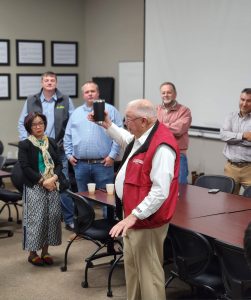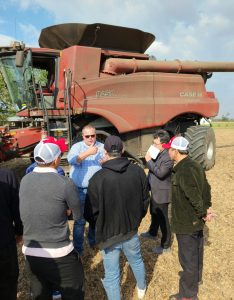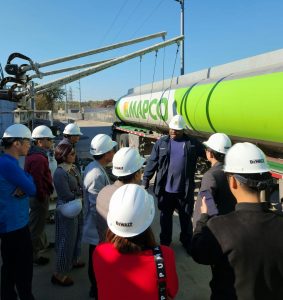| Following the U.S. Grains Council’s (USGC’s) Global Ethanol Summit (GES), held Oct. 16-18, 11 groups of attendees continued their educational and networking experiences by touring the bioethanol value chain across the country. Follow along with one of these teams below as Will Margerum, USGC communications coordinator and a Global Update editor, traveled to Kentucky and Tennessee with 15 influential industry stakeholders and policymakers from Vietnam as they sought to learn more about the environmental and economic benefits of bioethanol blending. |
|
Our group departed for Nashville, TN, on Oct. 18 and stopped at a retail gas station to chat with company management about how consumers have multiple fuel choices at the pump and how E10 accounts for more than 95 percent of the fuel consumed in the U.S.
Oct. 19 was a jam-packed day that kicked off with a meeting with local farming leaders and a tour of an equipment repair bay at H&R Agri-Power. Multi-generation farming families were on hand to answer questions about how U.S. producers have increased output while staying environmentally friendly, a major point of interest for many overseas consumers.
Next up was an in-depth look at bioethanol production facilities at Commonwealth Agri-Energy, including raw material deliveries, an on-site lab for quality control and co-product storage and handling.
The afternoon included a visit to Brandon Hunt’s third-generation, family-run farming operation that predominantly grows corn and soybeans. He was in the midst of harvesting soybeans and planting cover crops for the winter, just one of several sustainable farming methods used by U.S. producers year-round.
The final day of the trip began with another opportunity to observe a typical U.S. fuel station and witness drivers filling their vehicles with E10-blended gasoline. Participants (including me!) were also enthralled by a customer’s vintage truck and its owner was kind enough to chat with the group about its maintenance and fueling needs.
Attendees received a tour of Buckeye Fuel Terminal in Nashville to learn about bioethanol blending and storage before it heads to retail stations. We were lucky to have a truck arrive to fill up with bioethanol right next to us during the visit, and the driver was able to discuss his daily routine and safety protocols that ensure U.S. vehicles can stay on the move every day.
Agenda items like this impressed and reassured participants as they learned about the diligent product testing and secure transport methods throughout the bioethanol supply chain.

Programming concluded with a meeting at Eco-Energy, with presentations about the company’s marketing and business strategies.
Overall, it was clear to see how active and curious the attendees were in learning about U.S. bioethanol production as Vietnam is considering multiple avenues to decrease its climate footprint, including wider adoption of biofuels. Engagement activities like this and the rest of GES’s programming represent small steps toward a greener tomorrow.
Learn more about GES and its related activities
here.
About The U.S. Grains Council
The U.S. Grains Council develops export markets for U.S. barley, corn, sorghum and related products including distiller’s dried grains with solubles (DDGS) and ethanol. With full-time presence in 28 locations, the Council operates programs in more than 50 countries and the European Union. The Council believes exports are vital to global economic development and to U.S. agriculture’s profitability. Detailed information about the Council and its programs is online at www.grains.org.







